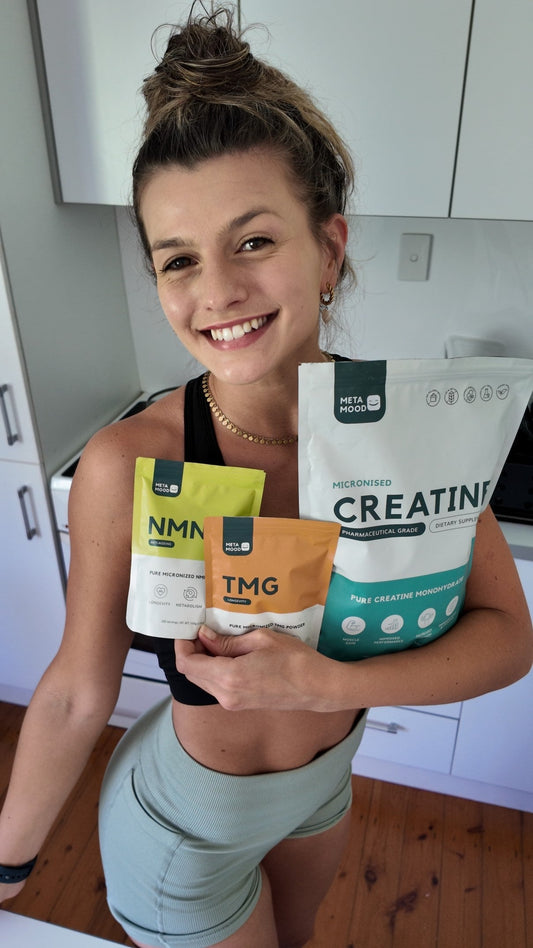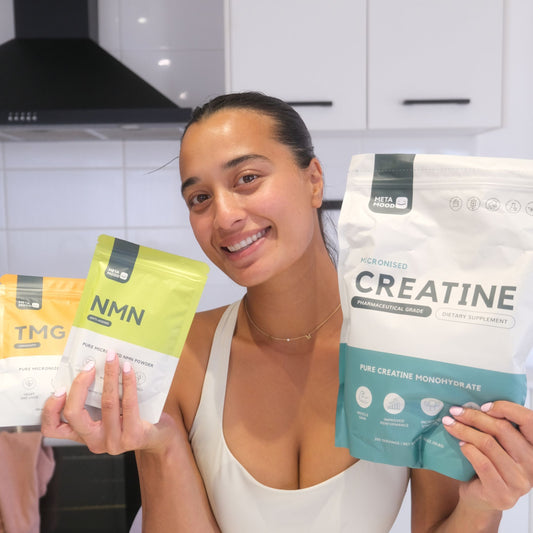Creatine is one of the most extensively researched supplements available today, popular for enhancing strength, muscle growth, and cognitive performance. Despite its proven efficacy, misconceptions often deter women from using creatine.
Women naturally have significantly lower creatine stores than men — estimates suggest 70% to 80% less — partly because they generally consume fewer creatine-rich foods like meat and fish. This means that women can see especially pronounced benefits from supplementation.
Let's address these myths and explore how creatine can significantly benefit women's health.
Creatine for Women: Debunking Common Myths
Myth 1: Creatine Causes Excessive Bulking in Women
A common misconception is that creatine supplementation leads to dramatic muscle bulk in women. In reality, women generally have lower testosterone levels, limiting significant muscle hypertrophy. Instead, creatine helps women build lean muscle, enhance exercise performance, and improve muscle recovery without causing an overly muscular appearance (PMC). It’s worth noting that any water retention from creatine is intracellular — stored inside muscle cells to support performance — not the kind of “puffy” bloating many women worry about.
Myth 2: Creatine is Unsafe for Women
Creatine is one of the safest dietary supplements, extensively studied across diverse populations, including women. Studies confirm its safety profile, with minimal side effects when consumed in recommended dosages. Regular supplementation even supports overall health, positively impacting physical and cognitive functions (PMC). Vegetarian and vegan women — who often have lower baseline muscle creatine levels — may experience even greater improvements in performance and muscle health when supplementing.
Myth 3: Creatine Causes Kidney Damage
Contrary to common belief, numerous studies have confirmed that creatine supplementation does not cause kidney damage in healthy individuals. Properly hydrated individuals without pre-existing kidney conditions can safely benefit from creatine supplementation (PMC).

What Are the Benefits of Creatine for Women?
Enhanced Strength and Performance
Creatine significantly improves strength, power, and performance in high-intensity activities. It works by rapidly regenerating adenosine triphosphate (ATP) — your muscles’ primary energy currency — allowing for stronger contractions, greater endurance in short bursts, and faster recovery between efforts. Women engaging in resistance training or high-intensity interval workouts can notably increase their exercise capacity and muscle strength, resulting in better training outcomes and overall fitness improvements (PMC).
Improved Muscle Recovery
Regular creatine use aids in muscle recovery after exercise by reducing muscle damage and inflammation, enabling faster return to training and consistent progress in fitness goals (PMC). It may also help offset performance dips linked to hormonal fluctuations during the menstrual cycle, postpartum recovery, or post-menopause, helping women maintain steadier strength and energy.
Support for Bone Health
Emerging research suggests creatine supplementation may positively influence bone health, potentially improving bone density and reducing the risk of osteoporosis, particularly relevant for women as they age (PMC). Older women, especially when combining creatine with resistance training, may experience additional benefits such as preserving lean mass and lowering fracture risk.
Read more about the Best Supplements for Women Looking to Enhance Strength and Energy.
What Does Creatine Do for Women?
Creatine for women may have cognitive benefits and support brain health.
Enhanced Cognitive Performance
Creatine isn't just beneficial for physical health; it's also important for cognitive function. Supplementation has been shown to improve memory, reaction times, and overall cognitive performance, particularly under conditions of stress or fatigue (PMC). Some research even suggests that women may see greater improvements in memory, attention, and processing speed than men, likely due to their lower starting creatine levels.
Protective Effect on Brain Health
Creatine may also provide neuroprotective effects, supporting brain health and reducing cognitive decline associated with aging. These benefits are significant for women aiming to maintain cognitive health throughout their lifespan (PMC).
Read more about whether or not whether or not creatine can improve brain function and mental clarity.
How to Effectively Use Creatine
-
Form: Creatine monohydrate is the most researched, effective, and affordable form of creatine, and is recommended for most women.
-
Dosage: A typical recommendation is 3-5 grams daily, with or without an initial loading phase. Most women do best with a steady daily dose rather than a high loading dose, which can sometimes cause mild gastrointestinal discomfort or temporary water weight gain.
-
Timing: Creatine can be consumed at any time of day, but the key is consistent daily intake. For optimal muscle creatine storage, pairing it with a meal containing both protein and carbohydrates can enhance absorption.
-
Hydration: Adequate water intake is essential to optimize creatine's benefits and support overall health.
Creatine offers substantial benefits for women looking to enhance strength, muscle health, and cognitive function. By dispelling myths and understanding its real advantages, women can confidently incorporate creatine into their health and fitness routines.
What’s the Best Creatine for Women?
When it comes to choosing the best creatine supplement, creatine monohydrate stands out as the gold standard. It’s the most researched form of creatine, proven effective for enhancing both physical performance and cognitive function. It’s also the most affordable option, making it easy to maintain as part of your daily routine.
For women, creatine monohydrate offers all the core benefits — improved strength, endurance, recovery, and brain health — without unnecessary additives. Look for a micronized powder (which has smaller particles for better mixing and absorption) and choose products that are third-party tested for purity.
Other forms of creatine — such as creatine hydrochloride (HCl), creatine ethyl ester, or buffered creatine — are often marketed as being more soluble or less likely to cause water retention, but research consistently shows no performance advantage over monohydrate. The key is not the form, but consistent daily use at the right dosage.
Frequently Asked Questions
What does taking creatine do for women?
Creatine helps women increase muscle strength, improve workout performance, speed up recovery, and support cognitive function. It can be especially beneficial because women tend to have lower natural creatine stores than men, making supplementation more impactful.
What should a woman know before taking creatine?
Women should know that creatine monohydrate is the most studied and effective form, and consistent daily intake (3–5 g/day) is key for results. It’s generally safe for healthy individuals, but those with kidney issues or who are pregnant should consult a healthcare provider first.
What does creatine do to women's hormones?
Creatine doesn’t directly change hormone levels but can help stabilize performance during hormonal fluctuations throughout the menstrual cycle, pregnancy, postpartum, and menopause. This is because supplementation keeps muscle creatine levels steady despite natural hormonal shifts.
Should women take creatine if they're trying to lose weight?
Yes — creatine doesn’t cause fat gain and may indirectly support fat loss by helping build lean muscle, which burns more calories at rest. Any small weight increase from creatine is due to water in muscle cells, not fat.
References
-
Antonio, J., & Ciccone, V. (2013). The effects of pre versus post workout supplementation of creatine monohydrate on body composition and strength. Journal of the International Society of Sports Nutrition, 10, 36. PMC
-
Kreider, R.B., et al. (2017). International Society of Sports Nutrition position stand: safety and efficacy of creatine supplementation in exercise, sport, and medicine. Journal of the International Society of Sports Nutrition, 14, 18. PMC
-
Kim, H. J., et al. (2018). Creatine Supplementation and Kidney Health. Nutrients, 11(1), 4. PMC
-
Buford, T. W., et al. (2007). International Society of Sports Nutrition position stand: creatine supplementation and exercise. Journal of the International Society of Sports Nutrition, 4, 6. PMC
-
Cooke, M. B., et al. (2009). Creatine supplementation enhances muscle force recovery after eccentrically-induced muscle damage in healthy individuals. Journal of the International Society of Sports Nutrition, 6, 13. PMC
-
Candow, D. G., et al. (2019). Bone health and creatine supplementation. Journal of the International Society of Sports Nutrition, 16, 17. PMC
-
McMorris, T., et al. (2007). Creatine supplementation improves cognitive performance in healthy individuals. Human Psychopharmacology: Clinical and Experimental, 22(2), 95-105. PMC
-
Smith, R. N., et al. (2014). Creatine Supplementation and Neuroprotection. Nutrients, 6(3), 1282-1301. PMC




